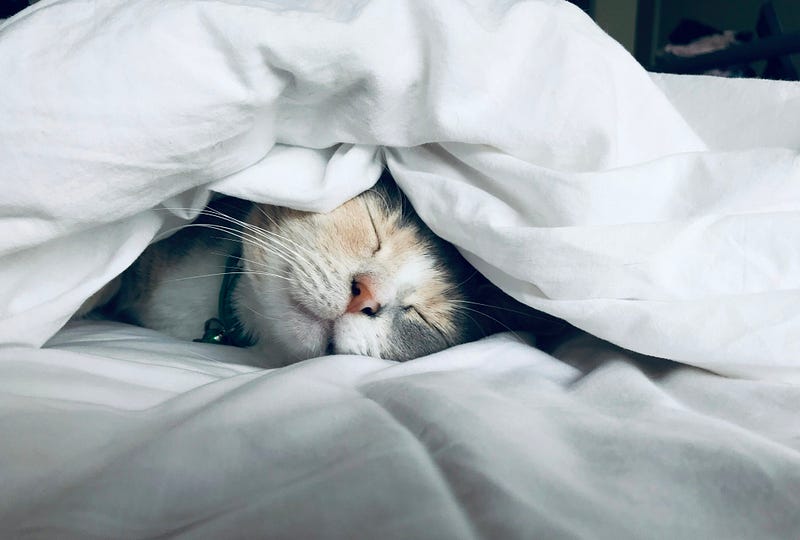Transforming from Night Owl to Early Bird: A Life-Changing Shift
Written on
Chapter 1: The Struggles of a Night Owl
Have you ever found yourself on the brink of sleep yet unable to drift off? What might have been the cause? Unless it involved working a night shift, battling insomnia, coping with an illness, cramming for exams, or something weighing on your mind, there’s a good chance it wasn’t necessary. Typically, night owls face significant challenges.
A recent survey indicates that approximately 25% of Americans go to bed after midnight. If that statistic seems surprising, consider that roughly 68% of individuals in my country also delay sleep past this hour. But does this imply they wake up late? Not necessarily. Many of us must rise early for school or work, resulting in inadequate sleep.
Research suggests a strong link between sleep deprivation and erratic sleep patterns. Those who stay up late often feel sluggish and out of sorts the next day. Some may experience headaches or anxiety, while others might notice impacts on their physical well-being.
While night owls might get as much sleep as their early bird counterparts, the quality of that sleep is often compromised. This lifestyle opposes our biological clock, which is naturally attuned to the availability of sunlight. Additionally, studies indicate that night owls often struggle with inconsistent sleep schedules. Maintaining a regular sleep routine is vital for allowing the body to adapt to a set sleep pattern. Therefore, if you choose to remain a night owl, at least commit to a consistent bedtime.
One major factor contributing to late-night habits is sleep procrastination. The average American reportedly spends 4 to 5 hours a day on their devices. Is there enough time for that amidst our busy lives? Many of us attempt to reclaim leisure time lost during the day, often leading to late-night screen time, which can be particularly tempting.

Chapter 2: My Journey to Becoming an Early Bird
I used to embody the night owl lifestyle, often hesitating to hit the hay. My routine typically involved sleeping from 2 AM to 9:40 AM, with a brief nap around 2 PM. While over eight hours of sleep sounds adequate, I found myself pushing bedtime to 3 or 4 AM, indulging in activities like browsing online or watching videos.
Despite feeling exhausted, I fought to stay awake, trying to maximize my evening hours. Even when I finally lay down, I struggled to fall asleep because I had been on my phone right before. It's well known that using screens prior to sleep disrupts sleep hormones like melatonin. On particularly bad nights, I would remain awake until dawn, listening to birds chirp outside. That was when I resolved to adopt a more reasonable bedtime—ideally 2 AM—while taking longer afternoon naps.
I soon discovered that extended hours of sleep did not alleviate my fatigue. Napping for two hours daily meant I could potentially sleep half the day, yet I still felt tired and sluggish, perpetuating a cycle that lasted for years.
Deep down, I recognized this lifestyle was unhealthy, but breaking the pattern seemed daunting. After all, going to bed late had been my norm since middle school, and I associated nighttime with productivity. My phone addiction compounded the issue, leading me to feel no urgency to change. Complacency was my companion.
The catalyst for my transformation came when I secured a job far from home, necessitating earlier bedtimes and wake-up calls. I needed to adapt, as I couldn't rely on quick naps to make up for lost sleep.
Surprisingly, all my fears were unfounded. I quickly recognized the benefits of rising early. My sleep quality improved, my overall well-being elevated, and I managed to break free from my phone dependency. Remarkably, I found I could thrive on just six hours of sleep without an afternoon nap. Most importantly, I discovered that I could focus best in the early hours before breakfast. The reasons for my nocturnal habits faded into the past.
It’s not an overstatement to say that transitioning to an early bird was one of the most significant changes in my life. For those night owls grappling with fatigue or discipline issues, I invite you to join me on the brighter side. While it takes determination to alter your routine, once you adjust, you'll find no regrets.
Chapter 3: Insights from Fellow Night Owls
In the video "Early Bird vs. Night Owl: Debunking Sleep Stereotypes," experts explore the myths surrounding sleep patterns and the impact on our health. This resource provides valuable insights into the benefits of waking up early versus staying up late.
In "I Became a Night Owl and Tracked My Productivity," the creator shares their journey and findings on productivity levels as a night owl, offering a unique perspective on the consequences of late-night habits.